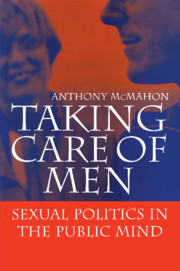Book contents
- Frontmatter
- Contents
- Preface
- Introduction: Changing Men?
- Part I The Interests of Men
- Part II The Revolving Door
- 3 Stalled Rhetoric: The Optimistic Will
- 4 It's on the Agenda: Optimism over Images
- 5 The New Father: The ‘Masculine’ New Man
- Part III The Blocked Door
- Conclusion: Waiting for the Man
- Bibliography
- Index
5 - The New Father: The ‘Masculine’ New Man
Published online by Cambridge University Press: 05 October 2010
- Frontmatter
- Contents
- Preface
- Introduction: Changing Men?
- Part I The Interests of Men
- Part II The Revolving Door
- 3 Stalled Rhetoric: The Optimistic Will
- 4 It's on the Agenda: Optimism over Images
- 5 The New Father: The ‘Masculine’ New Man
- Part III The Blocked Door
- Conclusion: Waiting for the Man
- Bibliography
- Index
Summary
While the New Man uneasily combined nurturer and narcissist, I argue in this chapter that the tension was resolved in new representations of men as fathers. The figure of the New Father combines the narcissistic consumer and the male nurturer in a way which flirts with the feminisation of men, but manages to neatly restate gender difference and male right. Superficially the appearance is one of sharing and gender convergence, but the underlying story is rather different.
Although we should be sceptical about the extent to which the domesticated New Man has featured on the public agenda, there is no denying that there have been significant shifts in the imagery of fatherhood. Even Mother's Day is an occasion for newspaper stories about fathers who care for their children, since ‘many men are proving that they, too, can mother’ (Melbourne Age, 9 May 1993). Absurd overstatement about social change is common: ‘A baby these days is no longer handed back to the mother when something is wrong’ (Roeber 1987: 181). Fatherhood newspaper columns became fashionable, for example, ‘Dad at Large’, a fortnightly column by Pete Barron, deputy editor of the English paper Northern Echo. The Independent (14 April 1996) described the way Barron wrote ‘without blushing’ about haircuts, crazes and crushes in ‘every doting detail’. Barron could not be home to help put his children to bed, but the family had a ritual: ‘They ring me at the office to say goodnight. You have a strange conversation with your son about how he's learned to use his potty, right in the middle of the newsroom.’ He admitted, however, that full-time childcare would ‘drive me mad’.
- Type
- Chapter
- Information
- Taking Care of MenSexual Politics in the Public Mind, pp. 116 - 150Publisher: Cambridge University PressPrint publication year: 1999



